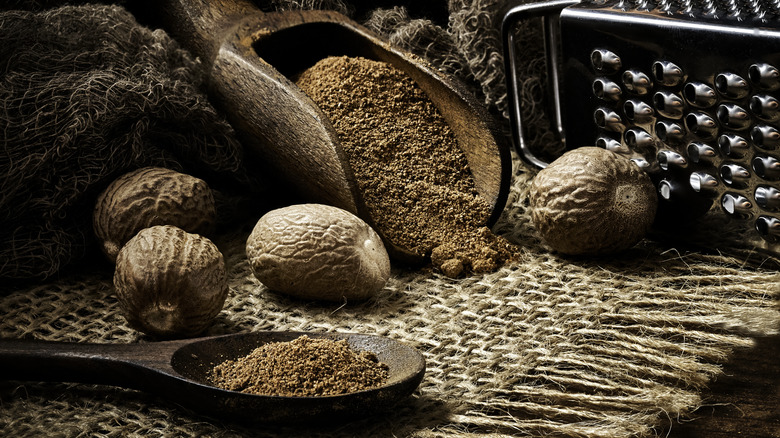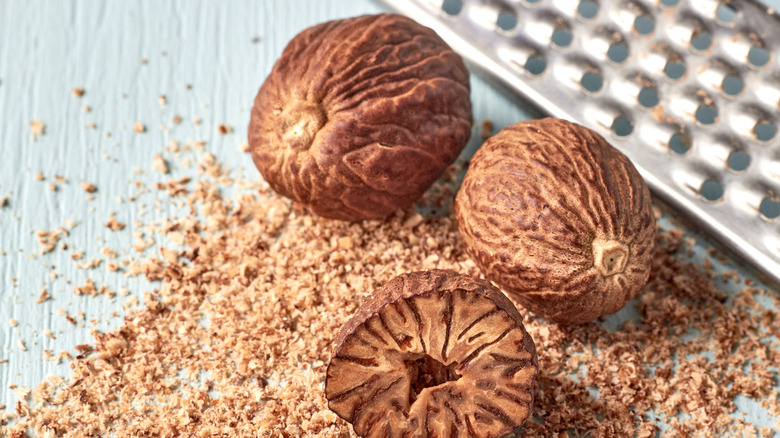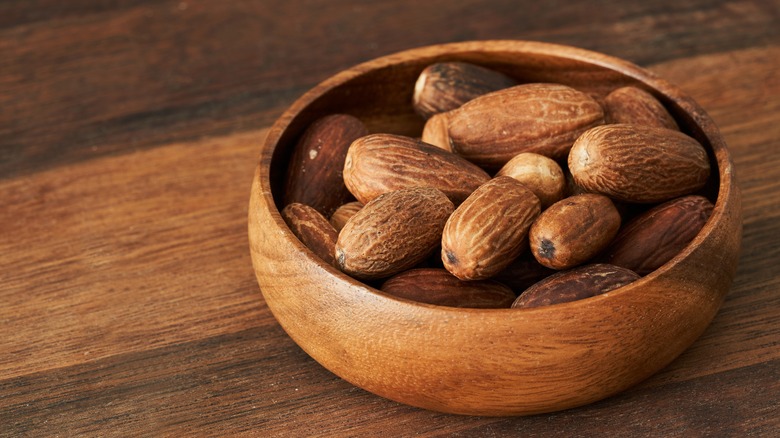You Should Be Adding A Dash Of Nutmeg To Your Mac And Cheese
Mac and cheese can go either way. You can open a box and make the most basic recipe possible, or you can go all out and craft an artisanal experience that could be considered fine dining. However, as Goldilocks pointed out, the best often falls between two extremes. You don't want food that is too little or too much; you want your mac and cheese recipe to be "just right."
It might seem a tad unusual, but one way to add something special to mac and cheese without going overboard is to season it with a dash of nutmeg. Nutmeg is a spice that triggers a warming sensation in the mouth and imparts a sweet, nutty flavor. While it is popular in the fall — think pumpkin spice — it may also bring to mind a familiar feeling of home and family many people experience over the winter holidays. This can amplify layers of flavor in classic comfort food, making your finished dish next-level satisfying.
Where does nutmeg come from?
Although nutmeg sounds like it would be hazardous for someone with a nut allergy to eat, it isn't a nut. Nutmeg is a seed from the Myristica plant, which is native to the Maluku Islands of Eastern Indonesia. This evergreen tree produces a fragrant apricot-like fruit with an oily kernel that is sun-dried for up to eight weeks before being sold to the public. The seed features an ovular shape with a wrinkled, dark-brown surface and can be found in its whole form or ground into a fine powder.
People often describe nutmeg as having a warm and nutty flavor. Since it is a seed, not a nut, nutmeg is typically a safe alternative for people with nut allergies; they can experience its unique, rich taste without the risks. However, per Healthline, people who are allergic to other seeds, such as poppy seeds, chia seeds, or sesame seeds, should likely avoid nutmeg. Talk to your doctor if you have any questions or concerns.
What makes nutmeg so appealing in mac and cheese
As previously noted, nutmeg has a wide variety of elements, such as the warming sensation it produces when eaten, that make it a fantastic seasoning choice for myriad dishes. In food terms, warming refers to that spicy, prickling sensation you get from certain foods that trigger a mild pain sensation on your tongue. The same slight burn your mouth processes after you eat wasabi and chili can be delivered by savory flavors, which include soy sauce and mushrooms. Additionally, you can experience it when eating sweeter spices, such as cinnamon, cloves, anise, and nutmeg.
This little tongue tingle adds the perfect amount of zing to a mild, creamy, or cheesy food and makes nutmeg ideal for sprucing up your cream sauces and cheese dips. It is a noteworthy addition to Alfredo sauce, Béchamel, and soufflés. In short, nutty heat is an ideal flavor to pair with macaroni and cheese.
Tips for adding nutmeg to mac and cheese
If you use fresh nutmeg in your homemade mac and cheese, wait until the end because freshly grated nutmeg has a more robust flavor profile. Conversely, adding nutmeg during cooking gives you a more subtle taste. If you want to put this spice front and center, add a dash to the top after cooking for presentation and flavor. For a more subtle hint of nutmeg, put it in the Béchamel sauce you use to create the base of your cheese sauce.
The most important thing to remember about adding nutmeg to any recipe is that a little goes a long way; using too much nutmeg isn't just overwhelming to your palate. Per Healthline and the Illinois Poison Center, this spice can be toxic in only a few teaspoons. Some symptoms of consuming excess nutmeg include confusion, upset stomach, and fainting. Fortunately, you won't need to risk nutmeg intoxication when you add it to your mac and cheese, as a dash (⅛-teaspoon) is usually enough. Plus, when using nutmeg in batch recipes, the portions will be divided, lessening the risk.
Bonus health benefits of adding nutmeg to food
While nutmeg adds a flavorful boost to your mac and cheese, it may also upgrade your diet with some unexpected benefits. Specifically, nutmeg has elements that may help prevent disease and benefit your overall wellness. Beyond that, a wide breadth of debatable positives are associated with consuming nutmeg in moderation.
According to WebMD, nutmeg may benefit humans by offering mood-enhancing properties and helping improve the quality and duration of sleep. Additionally, nutmeg is a source of abundant nutrients, including vitamin A, vitamin C, vitamin E, manganese, magnesium, copper, phosphorus, zinc, and iron. Very Well Health claims nutmeg can regulate blood pressure, ease pain, and supply the body with antioxidants. If that's not enough reason to add it to your mac and cheese, according to Healthline, nutmeg has been proven to significantly increase the sex drive in male rats, which is admittedly both promising and unsettling.




